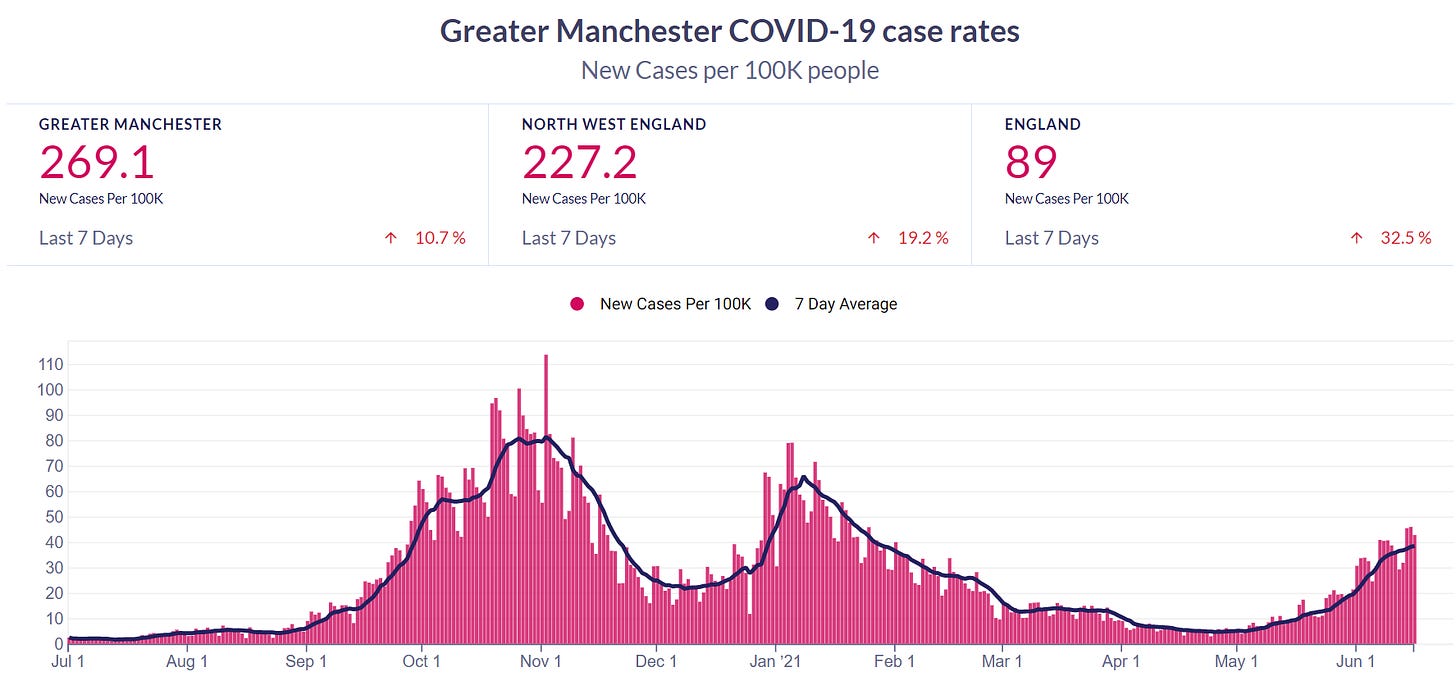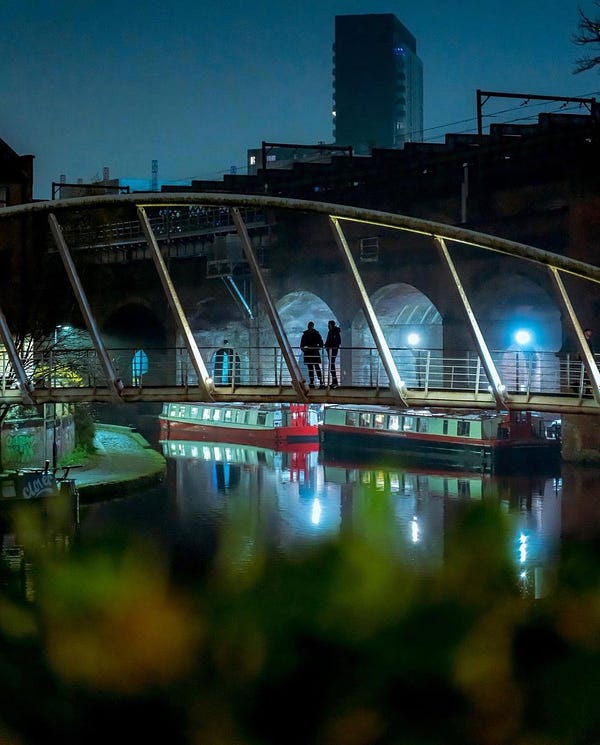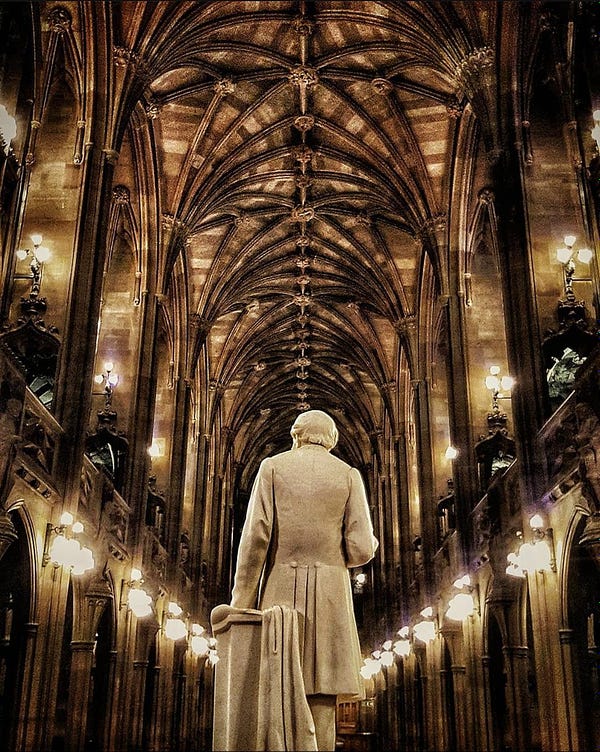'I’m at risk of losing everything'
A £92,000 bill lands in the cladding crisis. Plus the rest of the Monday briefing
Hello Millers — we’re back after our summer break and we have a packed briefing full of fascinating reads, great things to do and some eye-popping new developments in the cladding scandal.
Today was supposed to be the great day of freedom from Covid-19 restrictions. Instead, masks and social distancing continue — and to add insult to injury, a ban on non-essential travel between Scotland and Manchester and Salford has come into force. Andy Burnham said yesterday that the decision has been "announced out of the blue" and is "completely disproportionate".


If you’re a Mill member, we published our first-ever audio story last week. It’s a reading of ‘The Manchester dream’, our piece about the delivery rider Ahmed which went out in March. Listen to the audio story here.
This week’s weather
The big story: More huge bills in the cladding crisis
Top line: The true scale of the so-called ‘cladding crisis’ — and its impact on homeowners who face enormous bills to make their buildings safe — has been emerging over the past year. This weekend we learned more about its impact in Greater Manchester.
The Sunday Times spoke to young professionals in Connect House, a block containing 45 flats on Henry Street in Ancoats. All of them are being asked to pay through the nose in order to make their flats mortgageable (and sellable) again. The newspaper published a video interviewing a handful of residents, including Ashar Ali, 37, a teaching assistant who grew up in care and “who is bracing himself for a potential £92,000 bill.” Ali told the paper:
I went to university, got a good job, but I’m at risk of losing everything I’ve worked for because of someone else’s negligence.
Cladding fund: The government has offered to help out with the costs, but its £5.1 billion fund only covers blocks taller than 18m, or six storeys. That excludes people like 35-year-old Matthew Harris, an NHS laboratory assistant earning £22,500 a year who lives in Salford in a building that is 13m high. He got a £102,000 repair bill recently, despite only paying £88,000 for his flat in 2012, and is now trapped in his one-bedroom flat with his four-year-old daughter. “I thought I was going to throw up when I saw [my bill],” he told the newspaper.
The twist: Even in buildings where the cladding has been dealt with, residents can’t assume they are out of the woods. As the Sunday Times reports:
Two blocks in Manchester’s Green Quarter were among the first to have Grenfell-type ACM cladding removed but now leaseholders face charges of £30,000 each for a second wave of works totalling £10.3 million. After a consortium led by the developer Lendlease paid £7 million to replace the ACM, the two blocks in the quarter failed a EWS1 survey. It found flammable balconies, faulty cavity barriers and Grenfell-style Kingspan Kooltherm K15 insulation on untouched parts of the façades.
Bottom line: A combination of the fire safety crisis and the pandemic pushing people towards properties with gardens means that flat sales are in freefall. Transactions have fallen by more than a third since 2017. And because so many flats have been built in Manchester and Salford over the past decade, many of the people affected by these changes are here.
Get in touch: If you’ve been affected by the crisis and would like to tell your story, please email editor@manchestermill.co.uk.
Covid-19 update
Cases: The case rate in Greater Manchester is still growing, but much more slowly than we’ve seen in recent weeks. In that sense, the latest wave of the virus seems to be levelling out here. The latest GM case rate is 269.1, up 10.7% on the previous week, compared to the England rate of 89, up 32.5%. See our dashboard below for more details. Salford, Manchester and Bury now have the highest rates, all just under 350, whereas Oldham, Tameside and Stockport have the lowest — all around the 200 mark.
Hospitalisations: In the middle of last week there were 40 Covid-19 patients receiving mechanical ventilation in Greater Manchester’s hospitals, according to the government’s website, up from 29 the week before and 19 the week before that. These numbers are still much lower than the peak in February, when they were around four times higher.

Go deeper: Recently we sent members an in-depth analysis of how this wave of the virus in Greater Manchester compares to past waves in terms of cases and hospitalisations. Read it here.
Home of the week
This 5-bed semi-detached house in Prestwich is on the market for £775,000. It’s got lovely stained glass windows, a garden and spacious rooms.
Other local news in brief
The Manchester Arena bombing inquiry has sharply criticised police officers and private security staff for lapses and unprofessionalism on the night of the attack. The inquiry’s chairman Sir John Saunders said: “Everybody concerned with security at the arena should have been doing their job in the knowledge that a terrorist attack might occur on that night. They weren’t.” Read more.
A “life-long” Bolton Wanderer’s fan, Frank Arcus died last week aged 102. His granddaughter Jan Hampton told The Bolton News that he “always started the day off with a raw egg in sherry and was quite partial to Baileys in his coffee.” A day Frank recalled best was a “visit to Wembley in 1958 when Bolton beat Manchester United 2-0 to win the cup.” Read more.
A unique collection of books and manuscripts, featuring “an extremely rare handwritten copy of Emily Brontë’s poems, with revisions from Charlotte and the well-loved Brontë family copy of Bewick’s History of British Birds,” is going on sale in an auction. The collection from Littleborough's Honresfeld House also includes Emily Brontë’s holograph notebook of 31 poems, “believed by many scholars to have been lost.” Read more.
Notes from the past: The Manchester concerts
Modern Manchester is globally known for its music, but recent research has revealed that the city has a much longer musical legacy than was previously thought. Evidence has emerged of a series of “subscription” concerts in 1744 and 1745 at which music by some of the greatest Baroque composers of the day was played, including pieces by Handel, Corelli and Vivaldi. These are the earliest public concerts known to have been given in Manchester, back when it was a town of fewer than 20,000 residents. Intriguingly, some of the subscribers (think of them as the Millers of 1744 — the most cultured and civically engaged Mancunians) seem to have been supporters of the Jacobite Rebellion of 1745.
By a twist of fate, the programmes of all 16 concerts survive, which is very unusual. And now they are being recreated by Manchester Baroque, a chamber orchestra that plays on period instruments and has undertaken extensive historical research into its eighteenth-century predecessors. Mike Emmerich, one of the driving forces behind Manchester Baroque, is a longtime Mill member and told us about the fascinating history recently. The latest concert is this Friday evening at Stoller Hall and there are still some tickets left — click here to book.
Grist to The Mill: If you want to tell us about a story or pass us some information, please email joshi@manchestermill.co.uk or dani@manchestermill.co.uk. We are always happy to speak to people off the record in the first instance, and we will treat your information with confidence and sensitivity. Get in touch.
Our favourite reads
The Times: This recent profile of Chris Boardman, Greater Manchester’s “cycling tsar”, takes a look at how he hopes to transform how we move around. “When Chris Boardman now talks about riding around in circles, he is referring to his roundabout-style road junctions rather than a velodrome,” the piece says. It is hoped that there will be a 1,800-mile walking and cycling network across the region.
The Meteor: “It’s the only piece of land they have with a bit of sunshine to give them a pleasant life.” Hulme ‘Block the Block’ campaigners have been protesting against proposals for a student block on the site of an old pub. As development takes place across Manchester, the piece highlights what happens when communities feel they’ve been sidelined and won’t benefit from the changes happening around them.
The MEN: We enjoyed this piece about Marzia Babakarkhail, a family court judge who lives in Oldham but is originally from Afghanistan and left the country after run-ins with the Taliban. “They came to my house, they broke down the front door and treated my mother very badly,” she says. “I had to hide behind the back door, it was all very shocking. It was the first time my family had seen people with guns, they wanted to find me and shoot me.”
The New Yorker: Hannah Rosefield writes in this piece that the novelist Elizabeth Gaskell was “fiercely and explicitly” concerned with the political issues of her day. “As she writes in the preface to Mary Barton, she wishes primarily to raise awareness of the ‘agony of suffering’ of Manchester’s poor.”
Apollo Magazine: If you enjoyed our piece about the Wooden Canal Boat Society, we recommend this feature by James Purdon, who takes a look at the influence of canals on British artists. On The Opening of the Bridgewater Canal, AD 1761 (1892) by Ford Madox Brown, Purdon writes, “The people who matter in Brown’s painting are not the Duke contemplating his higher revenues, nor the burghers of Manchester seeking the adornment of painting for their civic offices, but the mass of people who haul the coal and tend the children.”
Things to do
Science and Industry Museum | Music-lovers won’t want to miss out on ‘Use Hearing Protection’, SIM's newest exhibition which tells the story of Factory Records' formative years from 1978 to 1982. You’ll be able to see creations from Joy Division, New Order and The Durutti Column. Book here.
The John Rylands | One of Manchester’s greatest treasures is reopening on Thursday. As well as being one of the “finest examples of neo-Gothic architecture in Europe,” the Rylands is also home to much of the University of Manchester’s Special Collections, the third-largest academic library in the country. Book your tickets in advance.
Oldham Coliseum | Now arts and culture venues are back open, you can at long last go to the theatre. We’re looking forward to seeing “The Greatest Play in the History of the World” in Oldham, which opens on Thursday. It’s about a man who “wakes in the middle of the night to discover that the world has stopped.” Book tickets here.
West African Dance | If you’ve ever wanted to learn how to do West African Dancing, this is the perfect opportunity. The classes are “uplifting” and “high-energy”, with live djembe drumming. They take place every Saturday. Classes are every Saturday at Birch Community Centre. Find out more and book your slot here.
Photography Exhibition | Kimpton Clocktower Hotel will be showing an exhibition ‘A Woman’s Work’, as part of its summer program of events. The show is curated by the British Culture Archive and will feature the documentary photography of Salford-born Shirley Baker, Tyneside photographer Tish Murtha and Heidi Alexander, who is known for documenting Stockport Market in the 1970s. Find out more here.


Letters to the editor
Dani's article looking into the experience of Manchester's cleaners resonated with me ("As Manchester starts its day, a quiet army finishes work"). I've worked across a series of office blocks in Manchester city centre in recent years and have been consistently struck by the racial and financial disparity between the workers occupying the desks in the offices and the people coming in a few times a week to clean them. I once came across a cleaner crying in our office toilet because she feared she wouldn't earn enough that month to be able to support both herself and her children. We agreed to meet secretly later that day so I could take out some money to give her. As with Manchester's Uber drivers, warehouse workers and hospitality staff, The Mill should definitely continue to spotlight the stories of those carrying out this underpaid, unglamorous, and often unnoticed work to support our city's growing — predominantly white — middle class. Chris, Hulme
I worked as a housekeeper in 2015-2016 for a country pub that also ran a boutique hotel. I mopped the floors, cleaned the toilets, did the rooms and laundry. I don’t know why but I felt so sheepish and apologetic if any of the guests saw me, even though I knew there was no shame in the type of work I was doing. I’d always greet them with a “good morning”, but you’d be surprised at the number of people who just ignored me and didn’t even return the courtesy. This piece shows that you can’t judge people by the work they do. I always make an effort to get to know the cleaners in my building. Kindness and understanding go a long way. “Cleaners are not quite invisible but they are definitely people whose work puts them in the background.” Emilie, Salford












Absolutely brilliant briefing; puts a whole new dimension to "rounded" reporting of what's relevant. Huge thanks to the hard workers who put this together.